| Reviews & Columns |
|
Reviews DVD TV on DVD Blu-ray 4K UHD International DVDs In Theaters Reviews by Studio Video Games Features Collector Series DVDs Easter Egg Database Interviews DVD Talk Radio Feature Articles Columns Anime Talk DVD Savant Horror DVDs The M.O.D. Squad Art House HD Talk Silent DVD
|
DVD Talk Forum |
|
|
| Resources |
|
DVD Price Search Customer Service #'s RCE Info Links |
|
Columns
|
|
|
Family Fang, The
Anchor Bay Entertainment // R // July 5, 2016
List Price: $22.98 [Buy now and save at Amazon]
The Film:
The subjectivity and integrity of different forms of art has become a unique talking point in indie dramas as of late, from the nature of counterfeit works and performance role-reversals to the struggle to overcome physical ailments in creating one's artistic pursuits. In his second directorial feature, Jason Bateman utilizes the bizarre, slightly twisted nature of rebellious performance art as the cornerstone for family drama, one with dark undertones about raising children amid such an adventurous lifestyle and how it impacts the trustworthiness and bonds formed between them. The Family Fang presents nuanced, unique performances from director Bateman and Nicole Kidman as their characters discover whether their crazy theatrical parents have really died or staged their death in another stunt, and while the film initially touches upon intriguing musings about the validity of their art and the merits of their parenting approach, it gets too hung up on its concept to properly grasp the depth of their relationships.
Tightly adapting from the bestselling novel from Kevin Wilson, The Family Fang centers on a brother-sister duo, Annie and Baxter Fang, who grew up as the offspring of a renowned couple responsible for daring works of performance art. Their pieces range from cautiously disturbing musical numbers to outright violent displays in public venues, building to a body of work that earned mastermind Caleb Fang (Christopher Walken) and his partner in crime, Camille (Maryann Plunkett), a modest but sustainable cult following.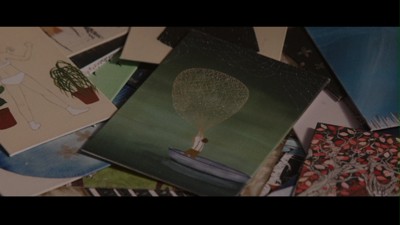 Several decades have passed, and the children have grown into creative professionals of their own: Annie has become a celebrated actress, though her popularity and public persona have waned as of late, and Baxter ekes out a living as a novelist and freelance journalist. When their parents go missing, with a bloodied car left as evidence, the two Fang children are forced to confront the possibility that their disappearance might be either a murder or yet another elaborate hoax.
Several decades have passed, and the children have grown into creative professionals of their own: Annie has become a celebrated actress, though her popularity and public persona have waned as of late, and Baxter ekes out a living as a novelist and freelance journalist. When their parents go missing, with a bloodied car left as evidence, the two Fang children are forced to confront the possibility that their disappearance might be either a murder or yet another elaborate hoax.
Jason Bateman directs The Family Fang into a slightly surreal, Charlie Kauffman-like tempo, cleverly keeping the bizarre upbringing and idiosyncratic personalities of the Fang children -- infantile behaviors, struggles with substance abuse, mistrust of their parents -- within the boundaries of realism. Tangled between "flashbacks" involving the performance pieces of their youth, which appear in gritty footage reminiscent of home movies, the film illustrates where these unusual public displays of art have changed their personality traits into the grown-ups they've become, both in their creative aspects and their jaded viewpoints of the normal world. These traits also give the leading actors slightly unique characters for Nicole Kidman and Jason Bateman to embody: Annie's hesitation, petulance and lack of maturation find an acerbic home in Kidman, while the more subdued attitude of Baxter drains Bateman of most of his comedic-relief energy, skewing more pensive and melancholy. Annie's easily the more intriguing character of the two, but their chemistry results in a uniquely damaged pair of siblings.
It's understandable that the Fang children were affected by their youth considering the shocking, subversive nature of the performance pieces in which they were involved. These aren't the staged moral thought-exercises or closed-off artistic displays one sees on YouTube nowadays, but real, live situations that incorporate bank heists, murders, even the appearance of explosives next to an infant, crafted with a touch of authenticity by Bateman that's designed to leave the viewer unsettled whenever the story cuts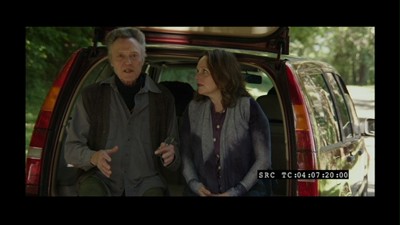 away to them. The Family Fang works hard to make the validity of this dangerous creativity its central feature, even going so far as to stop and have a pair of art critics literally debate the deeper intentions of the Fangs' body of work, insisting that Caleb and Camille Fang are relevant enough to thrive off this artistry. Through this, and through the narcissistic viewpoint of Christopher Walken's abrasive Caleb, The Family Fang takes on a hostile tone toward subjectivity and the dedication to one's artform, deliberately intended to not be enjoyable because of how this contentiousness factors into Caleb Fang's persona.
away to them. The Family Fang works hard to make the validity of this dangerous creativity its central feature, even going so far as to stop and have a pair of art critics literally debate the deeper intentions of the Fangs' body of work, insisting that Caleb and Camille Fang are relevant enough to thrive off this artistry. Through this, and through the narcissistic viewpoint of Christopher Walken's abrasive Caleb, The Family Fang takes on a hostile tone toward subjectivity and the dedication to one's artform, deliberately intended to not be enjoyable because of how this contentiousness factors into Caleb Fang's persona.
The Family Fang hits the road and picks up the pace once Annie and Baxter confront the possibility that their parents' disappearance might be yet another entry into their performance-art portfolio, treated by the authorities as the next in a series of highway rest-stop murders. Lots of plain exposition -- helped by interviews taken from a documentary on the Fang family -- bluntly highlights the points throughout their childhood when they were most traumatized and how they've coped by maintaining a bond, and the enigmas of their parents' disappearance use that information to create a solemn mystery alongside how "A and B" could make sense of their parents' departure. Unfortunately, many of director Bateman's deeper intentions are undone by loose ends and questionable choices hinged on the notoriety of the Fang family itself, undermining points that the story emphasizes about the dedicated and consuming nature of performance art. In the end, The Family Fang resembles the family's stunts: well-performed and affective in the moment, but only without any scrutiny or follow-up on what'd happen next.
The DVD:
Video and Audio:
While The Family Fang switches frequently between indoor and outdoor settings, much of the color palette revolves around subdued colors that lean more on the brownish side of things, muting the greens and blues and flesh tones throughout. Anchor Bay's 2.35:1-framed, 16x9-enhanced transfer responds well to those demands, yielding a dim, earthy, yet subtly attractive aesthetic that's capably sustained by its digital quality. Dark interior shots are frequent and do have to cope with some black levels that wash out and occasionally flatten underlying details, but for the most part they allow elements in mid-to-upper lighting to be quite visible in their rich surroundings. Scenes in woodsy outdoors environments reveal more clarity and depth, but they're merely serviceable in detail and depth, while the flashbacks to 30-some-odd years prior -- which were shot on 16mm film -- are appropriately gritty and intentionally tweaked. There's also a shift in aspect ratios whenever the "documentary" footage appears, which is often, so black bars will be visible at many points.
There isn't much to the sound treatment, either, so there isn't much for the 5.1 Dolby Digital track to do. Surround elements are few and far between and weren't really perceptible at any point during the film, even really during ambient musical moments, leaving almost all the activity to occur in the front channels. Of course, that's to be expected of such a dialogue-heavy film like this, and the tempo that it captures Nicole Kidman's collected alto tenor and Jason Bateman's moderately low voice touches upon satisfying bass levels and higher-end clarity. Aside from the fizzling of fireworks and the clanking of a dinner glass on the floor, there aren't really any strong sound effects necessary for the transfer to project. Everything in the track sounds discernible and natural, though, and the rhythmic musical treatment sounds quite lovely, and that's what matters. English SDH and Spanish subtitles are available.
Special Features:
The sole extra for The Family Fang, which is found underneath the "Setup" extension on the menu, is an Audio Commentary with Director/Actor/Producer Jason Bateman. The track remains relatively surface level, very conversational and laid back, subtly pushing in little insights about the film's production between stretches of silence. Bateman enjoys elaborating on a few little details throughout the film -- a gaffe involving a van, Kidman wearing a hairnet, the intentional dimness of the lighting, the deliberate off-putting nature of angles -- in between talking about shooting locations, working with the actors, and other general bits one would expect of a commentary track.
Final Thoughts:
The Family Fang possesses quite a bit of thought-provoking elements about performance art and the dynamics of a family embroiled in such persistent dishonesty and pursuit of their "work", and director Jason Bateman draws out strong performances -- especially form Nicole Kidman -- while the film's tone walks the line between the real and surreal. While clunky "necessary" exposition gets in the way of the drama's flow at many points, it's some of the logic behind the Fangs' mysterious disappearance itself that eventually hurts those themes as they come to fruition. Rent It.
Thomas Spurlin, Staff Reviewer -- DVDTalk Reviews | Personal Blog/Site
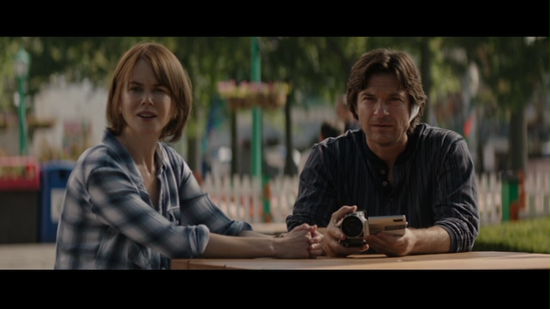 |
The subjectivity and integrity of different forms of art has become a unique talking point in indie dramas as of late, from the nature of counterfeit works and performance role-reversals to the struggle to overcome physical ailments in creating one's artistic pursuits. In his second directorial feature, Jason Bateman utilizes the bizarre, slightly twisted nature of rebellious performance art as the cornerstone for family drama, one with dark undertones about raising children amid such an adventurous lifestyle and how it impacts the trustworthiness and bonds formed between them. The Family Fang presents nuanced, unique performances from director Bateman and Nicole Kidman as their characters discover whether their crazy theatrical parents have really died or staged their death in another stunt, and while the film initially touches upon intriguing musings about the validity of their art and the merits of their parenting approach, it gets too hung up on its concept to properly grasp the depth of their relationships.
Tightly adapting from the bestselling novel from Kevin Wilson, The Family Fang centers on a brother-sister duo, Annie and Baxter Fang, who grew up as the offspring of a renowned couple responsible for daring works of performance art. Their pieces range from cautiously disturbing musical numbers to outright violent displays in public venues, building to a body of work that earned mastermind Caleb Fang (Christopher Walken) and his partner in crime, Camille (Maryann Plunkett), a modest but sustainable cult following.
 Several decades have passed, and the children have grown into creative professionals of their own: Annie has become a celebrated actress, though her popularity and public persona have waned as of late, and Baxter ekes out a living as a novelist and freelance journalist. When their parents go missing, with a bloodied car left as evidence, the two Fang children are forced to confront the possibility that their disappearance might be either a murder or yet another elaborate hoax.
Several decades have passed, and the children have grown into creative professionals of their own: Annie has become a celebrated actress, though her popularity and public persona have waned as of late, and Baxter ekes out a living as a novelist and freelance journalist. When their parents go missing, with a bloodied car left as evidence, the two Fang children are forced to confront the possibility that their disappearance might be either a murder or yet another elaborate hoax. Jason Bateman directs The Family Fang into a slightly surreal, Charlie Kauffman-like tempo, cleverly keeping the bizarre upbringing and idiosyncratic personalities of the Fang children -- infantile behaviors, struggles with substance abuse, mistrust of their parents -- within the boundaries of realism. Tangled between "flashbacks" involving the performance pieces of their youth, which appear in gritty footage reminiscent of home movies, the film illustrates where these unusual public displays of art have changed their personality traits into the grown-ups they've become, both in their creative aspects and their jaded viewpoints of the normal world. These traits also give the leading actors slightly unique characters for Nicole Kidman and Jason Bateman to embody: Annie's hesitation, petulance and lack of maturation find an acerbic home in Kidman, while the more subdued attitude of Baxter drains Bateman of most of his comedic-relief energy, skewing more pensive and melancholy. Annie's easily the more intriguing character of the two, but their chemistry results in a uniquely damaged pair of siblings.
It's understandable that the Fang children were affected by their youth considering the shocking, subversive nature of the performance pieces in which they were involved. These aren't the staged moral thought-exercises or closed-off artistic displays one sees on YouTube nowadays, but real, live situations that incorporate bank heists, murders, even the appearance of explosives next to an infant, crafted with a touch of authenticity by Bateman that's designed to leave the viewer unsettled whenever the story cuts
 away to them. The Family Fang works hard to make the validity of this dangerous creativity its central feature, even going so far as to stop and have a pair of art critics literally debate the deeper intentions of the Fangs' body of work, insisting that Caleb and Camille Fang are relevant enough to thrive off this artistry. Through this, and through the narcissistic viewpoint of Christopher Walken's abrasive Caleb, The Family Fang takes on a hostile tone toward subjectivity and the dedication to one's artform, deliberately intended to not be enjoyable because of how this contentiousness factors into Caleb Fang's persona.
away to them. The Family Fang works hard to make the validity of this dangerous creativity its central feature, even going so far as to stop and have a pair of art critics literally debate the deeper intentions of the Fangs' body of work, insisting that Caleb and Camille Fang are relevant enough to thrive off this artistry. Through this, and through the narcissistic viewpoint of Christopher Walken's abrasive Caleb, The Family Fang takes on a hostile tone toward subjectivity and the dedication to one's artform, deliberately intended to not be enjoyable because of how this contentiousness factors into Caleb Fang's persona. The Family Fang hits the road and picks up the pace once Annie and Baxter confront the possibility that their parents' disappearance might be yet another entry into their performance-art portfolio, treated by the authorities as the next in a series of highway rest-stop murders. Lots of plain exposition -- helped by interviews taken from a documentary on the Fang family -- bluntly highlights the points throughout their childhood when they were most traumatized and how they've coped by maintaining a bond, and the enigmas of their parents' disappearance use that information to create a solemn mystery alongside how "A and B" could make sense of their parents' departure. Unfortunately, many of director Bateman's deeper intentions are undone by loose ends and questionable choices hinged on the notoriety of the Fang family itself, undermining points that the story emphasizes about the dedicated and consuming nature of performance art. In the end, The Family Fang resembles the family's stunts: well-performed and affective in the moment, but only without any scrutiny or follow-up on what'd happen next.
The DVD:
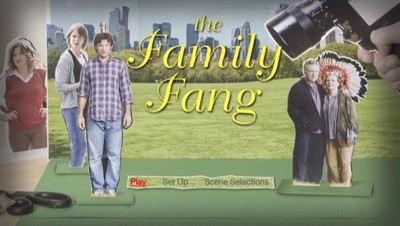 | 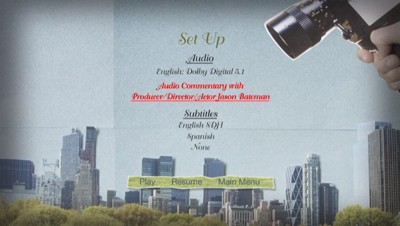 |
Video and Audio:
While The Family Fang switches frequently between indoor and outdoor settings, much of the color palette revolves around subdued colors that lean more on the brownish side of things, muting the greens and blues and flesh tones throughout. Anchor Bay's 2.35:1-framed, 16x9-enhanced transfer responds well to those demands, yielding a dim, earthy, yet subtly attractive aesthetic that's capably sustained by its digital quality. Dark interior shots are frequent and do have to cope with some black levels that wash out and occasionally flatten underlying details, but for the most part they allow elements in mid-to-upper lighting to be quite visible in their rich surroundings. Scenes in woodsy outdoors environments reveal more clarity and depth, but they're merely serviceable in detail and depth, while the flashbacks to 30-some-odd years prior -- which were shot on 16mm film -- are appropriately gritty and intentionally tweaked. There's also a shift in aspect ratios whenever the "documentary" footage appears, which is often, so black bars will be visible at many points.
There isn't much to the sound treatment, either, so there isn't much for the 5.1 Dolby Digital track to do. Surround elements are few and far between and weren't really perceptible at any point during the film, even really during ambient musical moments, leaving almost all the activity to occur in the front channels. Of course, that's to be expected of such a dialogue-heavy film like this, and the tempo that it captures Nicole Kidman's collected alto tenor and Jason Bateman's moderately low voice touches upon satisfying bass levels and higher-end clarity. Aside from the fizzling of fireworks and the clanking of a dinner glass on the floor, there aren't really any strong sound effects necessary for the transfer to project. Everything in the track sounds discernible and natural, though, and the rhythmic musical treatment sounds quite lovely, and that's what matters. English SDH and Spanish subtitles are available.
Special Features:
The sole extra for The Family Fang, which is found underneath the "Setup" extension on the menu, is an Audio Commentary with Director/Actor/Producer Jason Bateman. The track remains relatively surface level, very conversational and laid back, subtly pushing in little insights about the film's production between stretches of silence. Bateman enjoys elaborating on a few little details throughout the film -- a gaffe involving a van, Kidman wearing a hairnet, the intentional dimness of the lighting, the deliberate off-putting nature of angles -- in between talking about shooting locations, working with the actors, and other general bits one would expect of a commentary track.
Final Thoughts:
The Family Fang possesses quite a bit of thought-provoking elements about performance art and the dynamics of a family embroiled in such persistent dishonesty and pursuit of their "work", and director Jason Bateman draws out strong performances -- especially form Nicole Kidman -- while the film's tone walks the line between the real and surreal. While clunky "necessary" exposition gets in the way of the drama's flow at many points, it's some of the logic behind the Fangs' mysterious disappearance itself that eventually hurts those themes as they come to fruition. Rent It.
|
| Popular Reviews |
| Sponsored Links |
|
|
| Sponsored Links |
|
|
| Release List | Reviews | Shop | Newsletter | Forum | DVD Giveaways | Blu-Ray | Advertise |
|
Copyright 2024 DVDTalk.com All Rights Reserved. Legal Info, Privacy Policy, Terms of Use,
Manage Preferences,
Your Privacy Choices | |||||||















